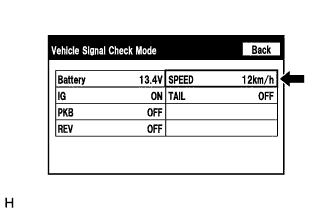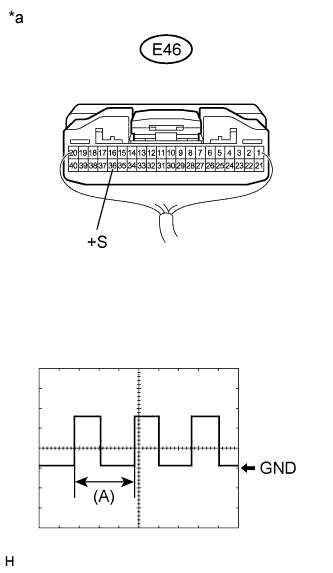Navigation System Vehicle Speed Signal Circuit Between Radio Receiver And Combination Meter
DESCRIPTION
WIRING DIAGRAM
INSPECTION PROCEDURE
CHECK VEHICLE SIGNAL (OPERATION CHECK)
INSPECT COMBINATION METER ASSEMBLY (OUTPUT WAVEFORM)
INSPECT RADIO AND DISPLAY RECEIVER ASSEMBLY
NAVIGATION SYSTEM - Vehicle Speed Signal Circuit between Radio Receiver and Combination Meter |
DESCRIPTION
for Navigation Function:
- The radio and display receiver assembly receives a vehicle speed signal from the combination meter assembly and sends the signal to extension module.
for Automatic Sound Levelizer (ASL):
- This circuit is necessary for the Automatic Sound Levelizer (ASL) built into the radio and display receiver assembly.
- The Automatic Sound Levelizer (ASL) function automatically adjusts the audio system volume level in order to compensate for increased vehicle noise (vehicle noise tends to increase as vehicle speed increases). The ASL adjusts the volume level based upon vehicle speed signals that it receives from the combination meter assembly.
for "Bluetooth":
- Vehicle speed signals are received from the combination meter assembly and used to cancel "Bluetooth" function operation.
The radio and display receiver assembly recognizes that the vehicle is being to driven and makes it impossible to connect or register a "Bluetooth" device while driving.
- HINT:
- A voltage of 12 V or 5 V is output from each ECU and then input to the combination meter assembly. The signal is changed to a pulse signal at the transistor in the combination meter assembly. Each ECU controls the respective system based on the pulse signal.
- If a short occurs in any of the ECUs or in the wire harness connected to an ECU, all systems in the following diagram will not operate normally.
WIRING DIAGRAM
INSPECTION PROCEDURE
- NOTICE:
- After replacing the radio and display receiver assembly of vehicles subscribed to pay-type satellite radio broadcasts, XM radio ID registration is necessary (w/ SDARS System).
| 1.CHECK VEHICLE SIGNAL (OPERATION CHECK) |
Enter the "Vehicle Signal Check Mode" screen. Refer to Check Vehicle Signal Check Mode in Operation Check (COROLLA_ZRE142 RM000003SKF0AEX.html).
| 2.INSPECT COMBINATION METER ASSEMBLY (OUTPUT WAVEFORM) |
Check the output waveform.
Remove the combination meter assembly with the connector still connected.
Connect an oscilloscope to terminal E46-36 (+S) and body ground.
Turn the ignition switch to ON.
Turn a wheel slowly.
Check the signal waveform according to the condition(s) in the table below.
Item
| Condition
|
Measurement terminal
| E46-36 (+S) - Body ground
|
Tool setting
| 5 V/DIV., 20 ms./DIV.
|
Vehicle condition
| Wheel being rotated
|
- OK:
- The waveform is similar to that shown in the illustration.
- HINT:
- When the system is functioning normally, one wheel revolution generates 4 pulses. As the vehicle speed increases, the width indicated by (A) in the illustration narrows.
Text in Illustration*a
| Component with harness connected
(Combination Meter Assembly)
|
| 3.INSPECT RADIO AND DISPLAY RECEIVER ASSEMBLY |
Check the input waveform.
Remove the radio and display receiver assembly with the connector still connected.
Connect an oscilloscope to terminal E129-17 (SPD) and body ground.
Turn the ignition switch to ON.
Turn a wheel slowly.
Check the signal waveform according to the condition(s) in the table below.
Item
| Condition
|
Measurement terminal
| E129-17 (SPD) - Body ground
|
Tool setting
| 5 V/DIV., 20 ms./DIV.
|
Vehicle condition
| Wheel being rotated
|
- OK:
- The waveform is similar to that shown in the illustration.
- HINT:
- When the system is functioning normally, one wheel revolution generates 4 pulses. As the vehicle speed increases, the width indicated by (A) in the illustration narrows.
Text in Illustration*a
| Component with harness connected
(Radio and Display Receiver Assembly)
|
| | REPAIR OR REPLACE HARNESS OR CONNECTOR (RADIO AND DISPLAY RECEIVER ASSEMBLY - COMBINATION METER ASSEMBLY) |
|
|




